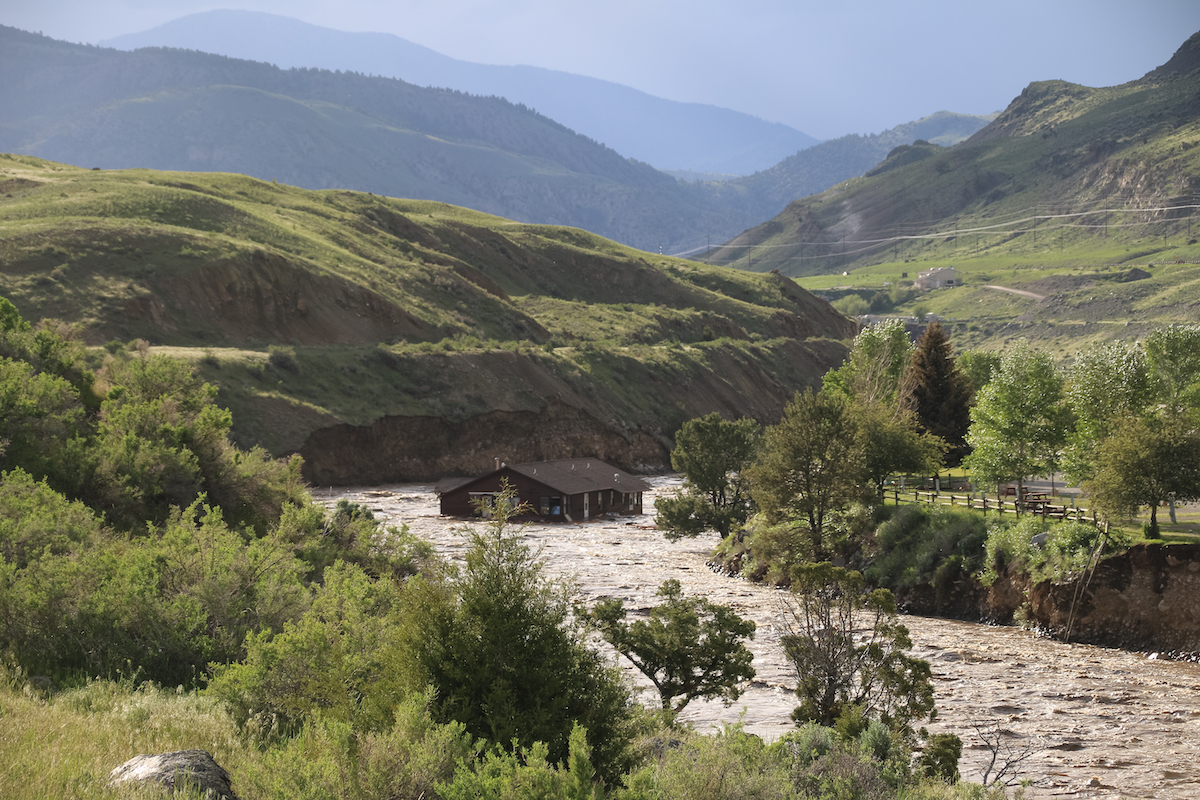What we’re watching: Weekly disaster update, June 20

We know all too well that disaster can strike at any time, in any place in the world. Some disasters make headlines; others do not. Here at the Center for Disaster Philanthropy, we keep an eye on the status of disasters worldwide and compile a list of the ones we’re tracking weekly, along with relevant disaster-related media coverage.
Here’s what we’re watching for the week of June 20, 2022.
New or Emerging Disasters
Floods – Montana: Heavy rains and rapid snowmelt caused historic flooding to Yellowstone National Park and surrounding communities. The flooding swallowed bridges, damaged sections of roadway and power lines, and temporarily disrupted water supplies. According to Montana Disaster and Emergency Services, eight bridges were washed out, and several cities in Park County have a water boil advisory in place.
The National Park’s gateway towns, particularly Gardiner, have been heavily affected by the disaster and will likely face long-term impacts. A long recovery lies ahead for the flooded towns. On June 16, President Biden approved a disaster declaration for areas affected by the storm and flooding. The declaration makes federal funding available for emergency work and facility repair. Rain-on-snow floods are expected to increase as climate change drives temperatures upwards.
Floods – Bangladesh: An estimated 4.3 million people are affected by the most recent monsoon rains in seven northeastern districts, including Sylhet, Sunamganj and Moulivazar. Up to 25,000 people have been taken to around 450 shelter centers in Sylhet alone. Damage to infrastructure has made communication and evacuations challenging, and many markets are not functioning. According to BRAC, the flood damage and impact on local populations are significant and widespread. Flooding may worsen in the low-lying areas of the northern and central regions. The recent flooding event occurred in the same areas of Bangladesh as the floods in May, complicating relief and recovery efforts.
Previous/Ongoing Disasters
Wildfires – Spain: A historic heatwave affecting large parts of the European continent have helped fuel wildfires across Spain. The World Meteorological Organization warned that almost the entire country faced “extreme fire risk.” Dozens of wildfires are burning in eight of the country’s 17 regions. The fires have burned at least 74,000 acres and forced hundreds of residents to evacuate. The Sierra de la Culebra, a mountain range in northwest Spain, was one of the areas most affected.
Monkeypox – Global: The Centers for Disease Control and Prevention has confirmed 113 cases in the U.S. As of June 15, the World Health Organization (WHO) said there were 2,103 cases reported from 42 countries since January. Nearly all the cases have been reported since May, and 84% of confirmed cases are from the WHO European Region. Other sources show even higher numbers of global cases.
Humanitarian Crisis – Ukraine: Since June 16, there have been more than 7.7 million border crossings from Ukraine since Feb. 24, according to the United Nations High Commissioner for Refugees. As of June 15, United Nations (UN) agencies and partners have reached more than 8.8 million people with life-saving assistance. The humanitarian situation is especially concerning in and around Sievierodonetsk, in the eastern Luhansk region, with diminishing access to clean water, food, sanitation and electricity.
According to Candid, 960 grants worth $1,179,194,476 have been granted so far, with an additional 174 pledges worth $696,733,080. Funders can share their grants data with them by emailing egrants@candid.org.
For more, see the Ukraine Humanitarian Crisis disaster profile and Ukraine Humanitarian Crisis Recovery Fund.
Worldwide – Coronavirus:
Key facts as of June 21:
- Worldwide, cases have surpassed 545 million.
- There have been more than 520 million recoveries and more than 6.3 million deaths.
- The highest number of cases are in the U.S. (88 million), followed by India (43.3 million), Brazil (31.7 million) and France (30.1 million).
- Worldwide, 66.3% of the global population has received at least one dose of a COVID-19 vaccine. This number drops to only 17.8% in low-income countries.
Other notable news:
- On June 16, the Food and Drug Administration authorized COVID-19 vaccines for children as young as six months old. The Centers for Disease Control and Prevention followed with their recommendation that all children 6 months through 5 years should receive a COVID-19 vaccine.
For more, see the COVID-19 Coronavirus disaster profile.
U.S. Midwest Low-Attention Disasters
The Midwest is regularly faced with low-attention disasters that affect people across the region. CDP’s Midwest Early Recovery Fund (ERF) effectively funds efforts that catalyze equitable disaster recovery.
These are some of the latest disasters the ERF team is monitoring:
- Sebastian County, Arkansas, was affected by flooding on June 10. Heavy rain caused water from Vache Grasse Creek near Greenwood to overflow, with at least 60 homes.
- A combination of factors, including high heat and humidity, caused the loss of cattle in Kansas, a rare event. Temperatures reached 108 degrees Fahrenheit (42 degrees Celsius) in northwest Kansas. The Kansas Department of Health and Environment knew at least 2,000 cattle deaths.
- Severe storms on June 11 caused around $10 million worth of damage in Manhattan, Kansas. Riley County issued a disaster declaration, and 20 properties received major damage.
- The County Board in Gage County, Nebraska, approved a disaster declaration for storms that caused damage on June 12. Local officials are in the process of determining whether damage levels meet thresholds for disaster assistance.
Complex Humanitarian Emergencies – Mali
Many places worldwide are experiencing emergencies caused by conflict, climate change, drought, famine, economic challenges and other conditions that combine to create a complex humanitarian emergency (CHE). CDP maintains complete profiles on several CHEs.
According to ACAPs in their recent report on violence in Mali, “Since the beginning of 2022, Ménaka and Gao regions in Mali, along with the tri-border regions in Niger and Burkina Faso, have been experiencing an escalation of violence caused by the territorial expansion interests of non-state armed groups.”
France recently departed a key military base in Ménaka, northeastern Mali, ahead of a final withdrawal from the country. The UN Secretary General’s Special Representative in Mali warned that the withdrawal could increase the risk of attacks in the region. The country’s relations with France have deteriorated since the Malian military’s takeover in May 2021.
Intermittent violence has made assessments difficult, and details on humanitarian needs are limited. During a visit to Mali at the end of May, UN Under-Secretary-General for Humanitarian Affairs and Emergency Relief Coordinator Martin Griffiths said he was “particularly concerned about the development of the situation in Ménaka, where civilians are threatened by the resurgence of violence, leading to displacement and an increase in humanitarian needs.”
It is estimated that more than 1.8 million people in Mali are experiencing acute food insecurity and need emergency food assistance. At the end of 2021, there were more than 326,000 internally displaced persons in the country.
What We’re Reading
- Global displacement hits another record, capping decade-long rising trend – UNHCR: The UN Refugee Agency’s annual Global Trends report reveals 89.3 million people were displaced by the end of 2021, an 8% increase from the previous year. Since then, the Russian invasion of Ukraine and other emergencies have pushed the figure over 100 million.
- Europe urged not to neglect other refugees amid focus on Ukraine – Euronews: Seven NGOs appealed to the European Union (EU) and member states to revive and scale up their resettlement efforts. As global displacement increases, the organizations reminded the EU of the scale of need and its commitments.
- On Climate Change’s Front Lines, Hard Lives Grow Even Harder – The New York Times: Rising temperatures make it more difficult to address challenges including poverty, food insecurity and health. “While disease outbreaks, flooding and harvest disasters capture headlines, activists and experts warn about the toll of more constant, routine threats.”
- Opinion: On Climate Change, Engage with Tribes as Partners not Applicants – Newsweek: Roger Fragua and Ryan Mast of Flower Hill Institute call for a recognition of the strength and value of traditional knowledge, sovereignty and culture. They say, “When it comes to nature and climate change, Indigenous peoples have much more to teach than learn.”
- Abbott baby formula plant closes again because of flooding – The Washington Post: Widespread flooding in and around Sturgis, Michigan, has led to the closure of an Abbott plant that produces EleCare and other specialty formulas. Four companies have dominated the U.S. formula market in recent years, and this flooding event highlights the fragile nature of the supply chain.
Juneteenth became a federal holiday in the U.S. last year. However, June 19 has been celebrated for years. These pictures capture Juneteenth celebrations over time.
